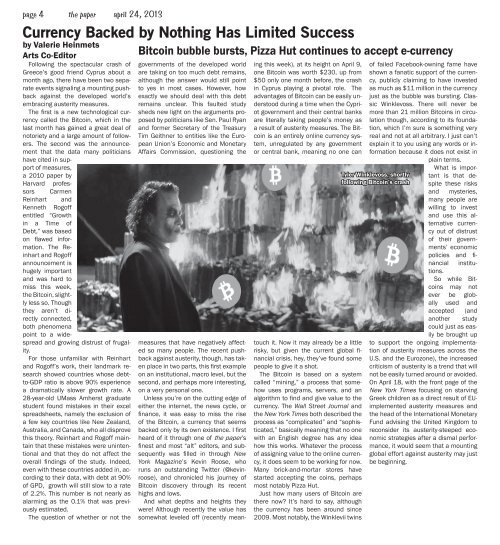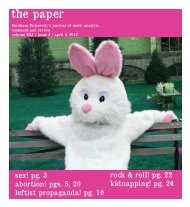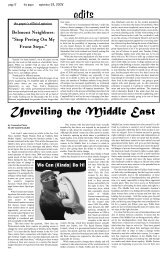Cover Issue 5.indd - the paper
Cover Issue 5.indd - the paper
Cover Issue 5.indd - the paper
- No tags were found...
You also want an ePaper? Increase the reach of your titles
YUMPU automatically turns print PDFs into web optimized ePapers that Google loves.
page 4 <strong>the</strong> <strong>paper</strong> april 24, 2013<br />
Currency Backed by Nothing Has Limited Success<br />
by Valerie Heinmets<br />
Arts Co-Editor<br />
Following <strong>the</strong> spectacular crash of<br />
Greece’s good friend Cyprus about a<br />
month ago, <strong>the</strong>re have been two separate<br />
events signaling a mounting pushback<br />
against <strong>the</strong> developed world’s<br />
embracing austerity measures.<br />
The fi rst is a new technological currency<br />
called <strong>the</strong> Bitcoin, which in <strong>the</strong><br />
last month has gained a great deal of<br />
notoriety and a large amount of followers.<br />
The second was <strong>the</strong> announcement<br />
that <strong>the</strong> data many politicians<br />
have cited in support<br />
of measures,<br />
a 2010 <strong>paper</strong> by<br />
Harvard professors<br />
Carmen<br />
Reinhart and<br />
Kenneth Rogoff<br />
entitled “Growth<br />
in a Time of<br />
Debt,” was based<br />
on fl awed information.<br />
The Reinhart<br />
and Rogoff<br />
announcement is<br />
hugely important<br />
and was hard to<br />
miss this week,<br />
<strong>the</strong> Bitcoin, slightly<br />
less so. Though<br />
<strong>the</strong>y aren’t directly<br />
connected,<br />
both phenomena<br />
point to a widespread<br />
and growing distrust of frugality.<br />
For those unfamiliar with Reinhart<br />
and Rogoff’s work, <strong>the</strong>ir landmark research<br />
showed countries whose debtto-GDP<br />
ratio is above 90% experience<br />
a dramatically slower growth rate. A<br />
28-year-old UMass Amherst graduate<br />
student found mistakes in <strong>the</strong>ir excel<br />
spreadsheets, namely <strong>the</strong> exclusion of<br />
a few key countries like New Zealand,<br />
Australia, and Canada, who all disprove<br />
this <strong>the</strong>ory. Reinhart and Rogoff maintain<br />
that <strong>the</strong>se mistakes were unintentional<br />
and that <strong>the</strong>y do not affect <strong>the</strong><br />
overall fi ndings of <strong>the</strong> study. Indeed,<br />
even with <strong>the</strong>se countries added in, according<br />
to <strong>the</strong>ir data, with debt at 90%<br />
of GPD, growth will still slow to a rate<br />
of 2.2%. This number is not nearly as<br />
alarming as <strong>the</strong> 0.1% that was previously<br />
estimated.<br />
The question of whe<strong>the</strong>r or not <strong>the</strong><br />
Bitcoin bubble bursts, Pizza Hut continues to accept e-currency<br />
governments of <strong>the</strong> developed world<br />
are taking on too much debt remains,<br />
although <strong>the</strong> answer would still point<br />
to yes in most cases. However, how<br />
exactly we should deal with this debt<br />
remains unclear. This faulted study<br />
sheds new light on <strong>the</strong> arguments proposed<br />
by politicians like Sen. Paul Ryan<br />
and former Secretary of <strong>the</strong> Treasury<br />
Tim Geithner to entities like <strong>the</strong> European<br />
Union’s Economic and Monetary<br />
Affairs Commission, questioning <strong>the</strong><br />
measures that have negatively affected<br />
so many people. The recent pushback<br />
against austerity, though, has taken<br />
place in two parts, this fi rst example<br />
on an institutional, macro level, but <strong>the</strong><br />
second, and perhaps more interesting,<br />
on a very personal one.<br />
Unless you’re on <strong>the</strong> cutting edge of<br />
ei<strong>the</strong>r <strong>the</strong> internet, <strong>the</strong> news cycle, or<br />
fi nance, it was easy to miss <strong>the</strong> rise<br />
of <strong>the</strong> Bitcoin, a currency that seems<br />
backed only by its own existence. I fi rst<br />
heard of it through one of <strong>the</strong> <strong>paper</strong>’s<br />
fi nest and most “alt” editors, and subsequently<br />
was fi lled in through New<br />
York Magazine’s Kevin Roose, who<br />
runs an outstanding Twitter (@kevinroose),<br />
and chronicled his journey of<br />
Bitcoin discovery through its recent<br />
highs and lows.<br />
And what depths and heights <strong>the</strong>y<br />
were! Although recently <strong>the</strong> value has<br />
somewhat leveled off (recently meaning<br />
this week), at its height on April 9,<br />
one Bitcoin was worth $230, up from<br />
$50 only one month before, <strong>the</strong> crash<br />
in Cyprus playing a pivotal role. The<br />
advantages of Bitcoin can be easily understood<br />
during a time when <strong>the</strong> Cypriot<br />
government and <strong>the</strong>ir central banks<br />
are literally taking people’s money as<br />
a result of austerity measures. The Bitcoin<br />
is an entirely online currency system,<br />
unregulated by any government<br />
or central bank, meaning no one can<br />
touch it. Now it may already be a little<br />
risky, but given <strong>the</strong> current global fi -<br />
nancial crisis, hey, <strong>the</strong>y’ve found some<br />
people to give it a shot.<br />
The Bitcoin is based on a system<br />
called “mining,” a process that somehow<br />
uses programs, servers, and an<br />
algorithm to fi nd and give value to <strong>the</strong><br />
currency. The Wall Street Journal and<br />
<strong>the</strong> New York Times both described <strong>the</strong><br />
process as “complicated” and “sophisticated,”<br />
basically meaning that no one<br />
with an English degree has any idea<br />
how this works. Whatever <strong>the</strong> process<br />
of assigning value to <strong>the</strong> online currency,<br />
it does seem to be working for now.<br />
Many brick-and-mortar stores have<br />
started accepting <strong>the</strong> coins, perhaps<br />
most notably Pizza Hut.<br />
Just how many users of Bitcoin are<br />
<strong>the</strong>re now It’s hard to say, although<br />
<strong>the</strong> currency has been around since<br />
2009. Most notably, <strong>the</strong> Winklevii twins<br />
of failed Facebook-owning fame have<br />
shown a fanatic support of <strong>the</strong> currency,<br />
publicly claiming to have invested<br />
as much as $11 million in <strong>the</strong> currency<br />
just as <strong>the</strong> bubble was bursting. Classic<br />
Winklevoss. There will never be<br />
more than 21 million Bitcoins in circulation<br />
though, according to its foundation,<br />
which I’m sure is something very<br />
real and not at all arbitrary. I just can’t<br />
explain it to you using any words or information<br />
because it does not exist in<br />
plain terms.<br />
What is important<br />
is that despite<br />
<strong>the</strong>se risks<br />
and mysteries,<br />
many people are<br />
willing to invest<br />
and use this alternative<br />
currency<br />
out of distrust<br />
of <strong>the</strong>ir governments’<br />
economic<br />
policies and fi -<br />
nancial institutions.<br />
So while Bitcoins<br />
may not<br />
ever be globally<br />
used and<br />
accepted (and<br />
Tyler Winklevoss, shortly<br />
following Bitcoin’s crash<br />
ano<strong>the</strong>r study<br />
could just as easily<br />
be brought up<br />
to support <strong>the</strong> ongoing implementation<br />
of austerity measures across <strong>the</strong><br />
U.S. and <strong>the</strong> Eurozone), <strong>the</strong> increased<br />
criticism of austerity is a trend that will<br />
not be easily turned around or avoided.<br />
On April 18, with <strong>the</strong> front page of <strong>the</strong><br />
New York Times focusing on starving<br />
Greek children as a direct result of EUimplemented<br />
austerity measures and<br />
<strong>the</strong> head of <strong>the</strong> International Monetary<br />
Fund advising <strong>the</strong> United Kingdom to<br />
reconsider its austerity-steeped economic<br />
strategies after a dismal performance,<br />
it would seem that a mounting<br />
global effort against austerity may just<br />
be beginning.



![Read Arts [PDF] - the paper](https://img.yumpu.com/50463455/1/167x260/read-arts-pdf-the-paper.jpg?quality=85)







